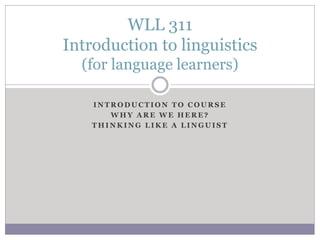
Day 1 - introducction.pptx
- 1. I N T R O D U C T I O N T O C O U R S E W H Y A R E W E H E R E ? T H I N K I N G L I K E A L I N G U I S T WLL 311 Introduction to linguistics (for language learners)
- 2. Who are we? Introduce yourself! Why do you study another language? What are the benefits of learning languages? What are the most exciting/joyous things about learning a new language? What are the most frustrating things? Describe a “light bulb moment” you have had learning/studying/speaking another language
- 3. Why are we here? Linguistics in general Explore/compare/contrast linguistic features Phonetics/phonology Morphology Syntax Language acquisition Language contact and change Language and culture (+ social values) Sociolinguistics. Keep in mind: How can I use this material to better understand the language I study? What do you already know about these topics? What do you find most interesting?
- 4. Define these words Phonetics: Phonology: Morphology: Syntax: Semantics Pragmatics: Speech as a physical process. Systems of linguistic sound structure. The structure of words. The structure of phrases/sentences The meaning of words and phrases. How speakers and writers use language to communicate. Adapted from Linguistics 0001: Introduction to Linguistics, Mark Liberman
- 5. How will this work? I don’t like lecture Workshop – input, work together, active learning Active learning requires students to think, discuss, challenge, and analyze information. Protocol - Read 15-20ish pages per day, answer discussion questions before every class, Class time – You come to class with basic knowledge, we talk together, application activities active learning Lecturing is boring. Forever Boring.
- 6. Why are we reading this textbook? Written by women Australian English (+ and -), Global focus. Other books have a LOT of English but few examples from other languages
- 7. Limits of this course… Intro to linguistic concepts Linguistic features of 5 languages (English, Spanish, French, German, Japanese) Language contact and change (5 languages) Language and culture (5 languages)
- 8. What is linguistics? How are linguistics and grammar different?
- 12. Excercises and activities Adapted from: Essentials of Linguistics, by Catherine Anderson Anderson, C. (2018, March 15). Essentials of Linguistics – Simple Book Publishing. Pressbooks. https://pressbooks.pub/essentialsoflinguistics/
- 13. Thinking like a linguist… Generate a sentence of English that you have never, ever uttered or heard before. Have a friend do the same thing. Exchange sentences with your friend. Were you able to understand each other’s sentences? How could you understand them, even though you had never heard them before?
- 14. Thinking like a linguist… Pretend you’re working for a start-up. Your company has developed a very cool new product, and they turn to you, the linguist, to come up with a name for this new product. It has to be a unique name that doesn’t already exist. What will you name your company’s cool new product? Now, look at this list of product names generated by other students. Which of them are good product names and which aren’t? What makes something a good name? mentocular swoodiei torrix baizan jibberdab keerild euquinu tuitionary kzen zirka hbiufk fluxon
- 15. Thinking like a linguist… Think of a word that has only recently entered English, so it’s not yet in mainstream dictionaries. Observe some examples of the word being used in context, either in your regular conversations or by searching online. Based on your observations of the word in context, write a dictionary definition of the word.
- 16. Thinking like a linguist… Think about all the languages that you speak, or about a variety of language that you’ve heard spoken by someone you know. Make two scientific observations about that language or a variety. Your observations might be about the sounds of the language, about the words, about how the sentences are organized, or about how people use different elements of the language. Remember that scientific observations are descriptive, not prescriptive.